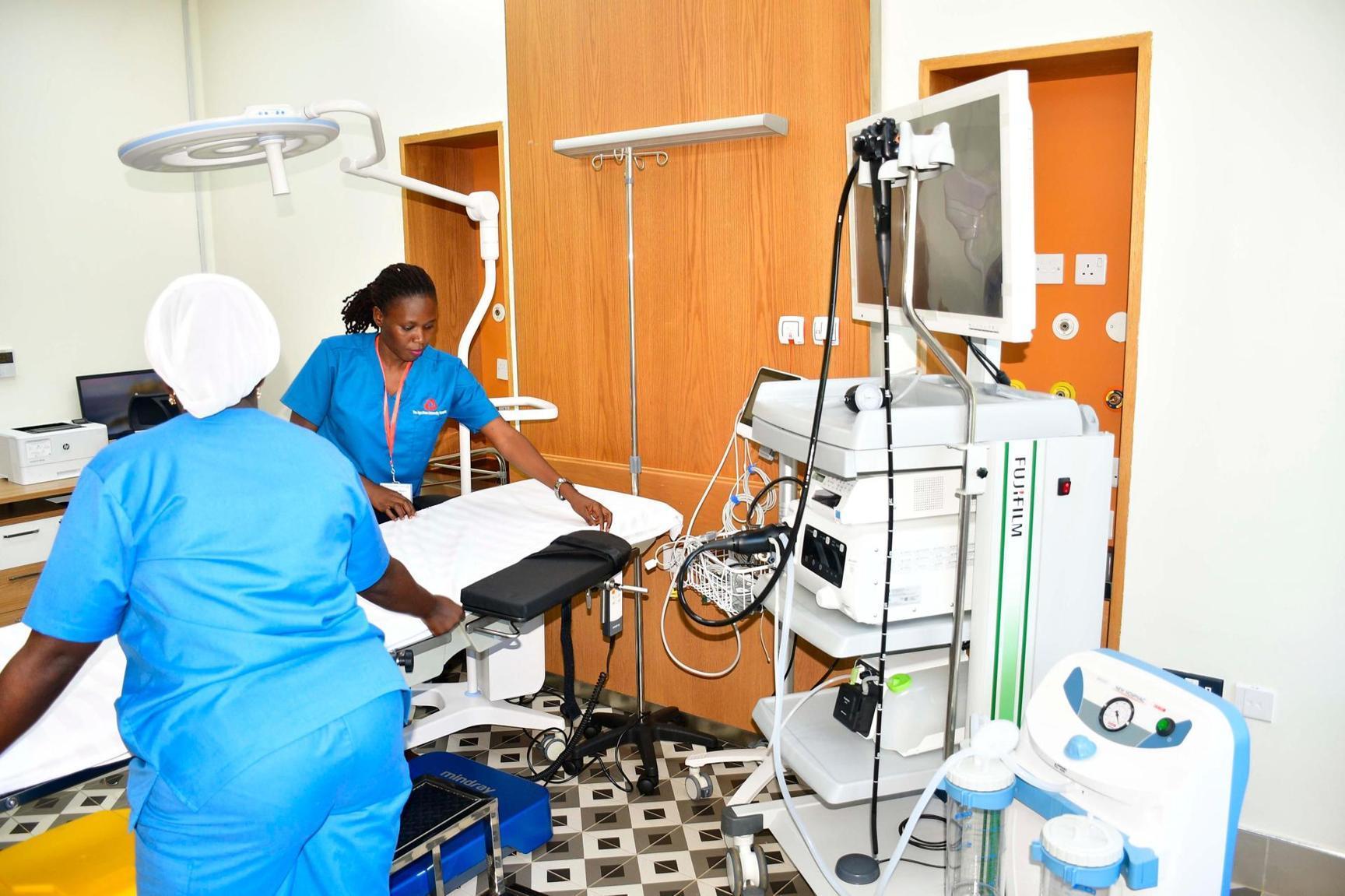Africa-Press – Uganda. The Aga Khan University Hospital’s Specialty Centre in Nakawa, Kampala, today opens its doors to the public and will, among others, handle patients with cancer, kidney diseases and brain complications.
Dr Deogratius Ssenkumba, a medical officer at the magnificent facility which was formally unveiled on Saturday, said they will for now focus on outpatients – those who do not require admission.
He revealed that patients will benefit from some of the best equipment installed for disease diagnosis and also access specialists for world-class curative care.
“This is the medical centre where we shall have specialist clinics, and we shall also have a general doctor around. So, we shall be having specialists running outpatient clinics,” he said, adding, “We have eight consultation rooms meaning at any one point, there will be eight specialists seeing patients.”
The Centre has on its staff consultant gynaecologists, paediatricians, dentists, neurologists (for brain and nerves), oncologists (cancer treatment), and general surgeons.
The other specialists available at the facility include an “endocrinologist (specialist in hormone-related conditions), neurophysiologist (specialist that assesses the functioning of nerves in the body), nephrologist (for kidney issues), physiotherapist and orthopaedic surgeon.”
In an interview last evening, Dr Ssenkumba explained that they are focusing on outpatients because the facility that would allow for admission is still under construction.
“We don’t have yet admission rooms like wards. [But] we have resting rooms for patients who are recovering from procedures that require anaesthesia. Afterwards, you go home. We shall also be making referrals for those who require,” he added.
Officially named Nakawa Specialty Centre, the facility will provide chemotherapy, dialysis, and diagnostic imaging such as Computed Tomography (CT) scans and gynaecology and obstetrics services.
Others include endoscopy (for diagnosing diseases of the stomach and intestine), colonoscopy (for examining the colon), hemodialysis and nephrology services alongside access to medical specialists in diverse fields.
The high-end services at the Centre are a harbinger of world-class services to be provided by the combined Aga Khan University campus, a teaching hospital and students’ residences under construction in Nakawa, a Kampala suburb.
Once completed, the institution will provide modern facilities for top-end training of health and other professionals and super specialised curative care, with direct dividends for local communities, Uganda and the broader East Africa region.
The training fields for high-quality doctors and resulting patients’ services will include internal medicine, surgery, paediatrics and obstetrics and gynaecology.
Besides training nurses, midwives and allied health professionals, the range of services the university and the teaching hospital are billed to offer will reduce the need for Ugandans to travel abroad for specialised treatment, Ms Diana Namubiru, the senior manager of country operations and business development at Aga Khan University Hospitals, said on Thursday.
This in turn will save costs for patients and families while improving the chances of patients’ survival due to timely diagnostics and treatment, she added.
The Aga Khan Hospital in Nairobi, Kenya, and other medical facilities in India, Turkey and the United States are choice destinations for Ugandans who can afford, to seek super-specialised care, costing several millions of Uganda shillings.
In yesterday’s interview, Nakawa Specialty Centre’s Dr Ssenkumba said their costs will be “affordable [and] below the charges” Ugandans pay while seeking treatment in Kampala or elsewhere.
Addressing journalists on Friday, Aga Khan University Hospital Chief Executive Officer Rashid Khalani said their neurophysiology programme, which focuses on diagnosing and treating neurological disorders, also aims to research the disease burden in Uganda and the causes in order to provide appropriate treatment where necessary.
“Previously, Uganda [in particular] and Africa [in general] have been known for communicable diseases like malaria and HIV/Aids, but now non-communicable diseases like cancer, heart attacks, hypertension, and kidney disease have taken over,” Mr Khalani said.
He added: “We want to bring the specialised care of chronic disease [closer]… We have brought the electroencephalography and electromyography equipment to check the nerves.”
Mr Khalani said in Kenya and Tanzania where the Aga Khan University hospitals have a presence, they are registering increasing numbers of patients presenting with brain-related diseases that affect the nervous system.
In Uganda, he said the disease burden isn’t known, but they believe Uganda is no exception because it already has cases of cerebral malaria, stroke, epilepsy, brain tumours, spinal code compression, and meningitis, among others.
Dr Sulaiman Shahabuddin, the president of Aga Khan University, said one year after the groundbreaking ceremony for the construction works at the Nakawa campus, they are happy with the progress which is why they opted to open the Specialty Centre which is equipped with advanced diagnostic equipment for chemotherapy, dialysis, CT scan.
He said they are in the advanced planning and designing stages of the Aga Khan Hospital whose construction will start soon.
“When this hospital and campus take their place alongside the many other hospitals and clinics that AKU and the Aga Khan Health Services operate in the region, we will have laid the foundations for something extraordinary; namely, an integrated network of international-quality health and education institutions that spans East Africa,” he said on Saturday after unveiling the Nakawa centre.
The Aga Khan University and the Aga Khan Health Services operate five hospitals and more than 100 clinics that care for 2 million-plus patients annually in Kenya, Tanzania and Uganda.
The Kampala project is one of AKU’s largest investments in East Africa to date.
Speaking at the official opening of the Nakawa Specialty Centre on Saturday, Uganda’s State Minister for Primary Healthcare, Ms Margaret Muhanga, said the facility will “boost access to specialised quality healthcare to our people and reduce the need to travel abroad”.
“The government is committed to providing quality healthcare to all citizens and we are happy to walk this journey with our worthy partners like the Aga Khan University,” she added.
The Centre adds to AKU Hospital’s three other medical centres in Kampala; at Acacia Mall in Kisementi, Metroplex Mall Naalya, and the DTB Building.
Ambassador Amin Mawji, the diplomatic representative of the Aga Khan Development Network in Uganda, noted that the opening of the Nakawa Specialty Centre marks the beginning of the journey to bring quality healthcare home to save Ugandans from travelling abroad for treatment.
“The opening of the Nakawa Specialty Centre marks an important step in our mission to bring high-quality healthcare closer home for Ugandans. We are here to eliminate the days of waiting or travelling abroad to get the care you need,” Ambassador Mawji said.
At the Saturday event, AKU President Shahabuddin thanked Aziz Manji and his wife Zubeda Manji for their family contribution of $6m (Shs23b), the largest single contribution to bankrolling the construction of the Nakawa Specialty Centre.
Mr Manji, a Canadian Real Estate mogul and hotel chain owner, said the donation to facilitate access to high-quality healthcare was their way of thanking Ugandans and the government for hosting and providing them free education in 1972, which nurtured him into what he is today.
According to Mr Islam Zaki, the project engineer from Arab Contractors, the first project involving constructing the academic building and a nine-storey structure to house 200 students, which started on December 20, 2022, is expected to be completed next January.
For More News And Analysis About Uganda Follow Africa-Press






